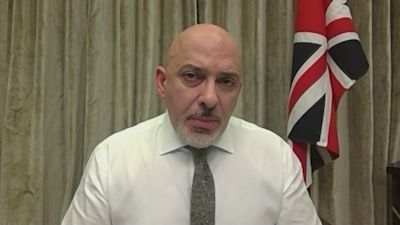Covid: Early data on vaccine effect on transmission 'encouraging', Zahawi says

Coronavirus vaccines are having a "really encouraging" impact on transmission, early data seen by the government suggests, but vaccines minister Nadhim Zahawi warned the full data may not be ready for several weeks.
Boris Johnson is "hopeful" lockdown can be eased in the coming weeks, adding that vaccines are providing “grounds for confidence” that transmission is being reduced.
But he told Monday's Downing Street press conference he was awaiting the "hard facts" before setting out the timetable for easing the lockdown.
While there is data on coronavirus case numbers, hospital admissions and deaths, the impact of the vaccine rollout on transmission is yet to be fully determined and may play a key role in how lockdown will be loosened.
Mr Zahawi said early research from Oxford University has been promising but cited two ongoing Public Health England (PHE) studies on the impact of vaccines on Covid-19 – the Vivaldi study on care home residents and staff, and the Siren research on healthcare workers – as being key.
“We’ve got to make sure that you bring down the infection rates, hence why we’re waiting to see the data on transmission. The Oxford team had some early data which is really encouraging on transmission, which has to be peer-reviewed,” he told Times Radio.
But he stressed it is currently uncertain how much of the reduction in infections being seen is down to lockdown restrictions or the vaccine rollout, and suggested the full research may not be available for a number of weeks.
“We have a couple of very large-scale studies related to giving us better data on the vaccines,” Mr Zahawi told BBC Radio 4’s Today programme.
“We should be able to see really good data in the next few weeks from those studies.”
He told ITV News ministers want lives to "return to as normal as possible, as quickly as possible" but said decisions should be based on "data not dates".
"I think it will be a combination of surge testing, isolation, as well as a national vaccination programme that will get our lives back.
"But the way to do it is to follow the data, the evidence, we've got these large scale data gathering programmes of the effectiveness of the vaccines and we'll be able to share that roadmap on February 22."
He said the government will "gradually reopen the economy" as more data on vaccine effectiveness becomes available.
Preliminary data comparing elderly people who have received the vaccine with those who have not is starting to show it is cutting hospital admissions and deaths, according to the Times.
The paper said ministers have already been given data showing that vaccines are cutting illness by about two-thirds, while a separate study suggests jabs are reducing transmission.
Listen to the ITV News Politics Podcast:
But Mr Zahawi told Times Radio: “We’re beginning to see more and more data but at the moment it’s far too early to begin to speculate on the quality of the data.”
He said vaccine supplies at the moment are “finite” but expressed confidence that the government will reach its next target of vaccinating another 17 million people, including all over-50s and those in at-risk groups, by the end of April.
“I see much greater volume in March and April – tens of millions of doses coming through – and I’m confident that we’ll hit our target,” he told BBC Breakfast.
Mr Zahawi said the government was working to combat the "tsunami of disinformation" around the safety of the Covid vaccines.
He told Sky News: "We're translating everything into 20 languages, from Arabic, to Farsi, to Hindi, to Polish, across the board. We have to reach those hard-to-reach groups. "Although vaccine positivity in the UK - adults saying they will take the vaccine - is at 89%, the 11% that are vaccine hesitant or have questions skew heavily towards some of the ethnic communities - the black and Afro-Caribbean communities, the Indian and Pakistani and Bangladeshi communities."
The prime minister said on Monday that there are “grounds for confidence” that vaccines are helping to curb the spread of coronavirus, not just in protecting those who received the jab.
He told a Downing Street briefing: “We have some interesting straws in the wind, we have some grounds for confidence, but the vaccinations have only been running for a matter of weeks.”
NHS England chief executive Sir Simon Stevens said the end of April target to vaccinate those in the next five priority groups has been set due to “likely vaccine supply”, but added “if supply increases then we think we can go faster”.
He confirmed that vaccines are being reserved for second booster doses, as he described the rollout of the inoculation programme as “two sprints” followed by a marathon.
On Tuesday, the Scottish Government is expected to make an announcement on the return to school of some pupils, including those aged between four and seven.
Mr Johnson has said that, in England, no decisions have been made on whether all pupils can return to school at the same time on March 8 after reports suggested a staggered approach may be taken, with secondary schools going back a week later than primaries.
Meanwhile, a new study by epidemiologists at the University of Warwick has suggested schools do not play a significant role in driving the spread of Covid-19 in the community.
Listen to the ITV News Coronavirus Podcast: